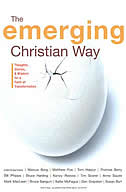| Session 8 |
The Emerging Christian Way: Thoughts, Stories & Wisdom for a Faith of Transformation by 14 current voices, from Copper House - Wood Lake, ed Michael Schwartzentruber |

|
 |
||
| "These are exciting times for those who call mainline Christianity "home". It is also an exciting time for those who have "left home" - perhaps because of frustration, or boredom, or doubt - are wondering if they might yet find a reason to return." ... from the Conclusion. |
| Index | Ch. 13 - Grayston | Part 2 - | Spiritual Development | Discussion Notes | References |
| Summary Notes: Ch. 13. - Pastoral Care for the 21st Century - Donald Grayston | |||||
Donald Grayston has been Anglican Priest, a University Professor and involved with the Spiritual Direction movement. From these 3 perspectives and experiences he sees the future of the church requiring a new understanding of pastoral care. This is his website. He concludes the chapter thus:"The challenge to Christian congregations in the 21st century is to move beyond the segmentation of ministries towards an integrative approach to the formation of healthy, adult Christians. Such Christians will seek out and exercise caring ministries, and ministries of compassion, justice, spiritual direction, and intergenerational bonding and reconciliation. The church is waiting for us to get moving on this. and whether it knows it or not, the world is waiting for us, too."These are his points and his challenges: Work with the people who want to work with you. Don't try for everyone. Adults study comparative religion because they are researching where to ground their new found spirituality. The story of Jesus has been seriously marginalized. Without a story, there is no relationship. The Spiritual Direction movement has been flourishing in modern times as people seek to guide and be guided. Pastoral Care and Adult Christian Education No longer separable from other ministry. Their coming together defines spiritual formation in adults. Jesus responded to persons in crisis. It transformed them. Adults coming to faith should not have a few weeks of creeds and doctrines. He suggests a more serious regimine Most especially that adults be taught not merely the description of faith, but the practice of faith. That persons returning or coming to the church should be instructed in prayer, meditation, fasting, tihthing, pilgramage, and the art of daily spiritual practice, (he is after all an Anglican!). But mostly they should be instructed in the mandate of Micah 6:8 - of doing justice, loving kindness and walking humbly with God. A weekly program for this would seem appropriate. Membership in NGO's active in justice. Consideration of other relgious tradition. And especially to bring back and share these experiences in the church community. In such an environment, the minister could be a facilitator working "in depth with awakened and awakening adults" Spiritual Formation and Adolescents Rites of Passage is the byword here. He frankly discusses the present world of the modern adolescent, including their active sexuality. The church has a "golden opportunity" to work with teens and parents to establish such Rights of Passage. He speaks well of Youth Ministry and Spirituality Project , and Leader Resources (of the Episcopal Church) in the US. This is his framework:
You might recall John and Sylvia Griffith who after leaving St. David's some years back formed Spiritual Directions and provides similar sorts of services that Grayston mentions in Vancouver. John and Sylvia do more to provide spiritual direction than focus as Grayston has done on the training of spiritual directors. The Christian Way is not the Secular Way. Spiritually awakening people need a church that feeds them. People are ready for a church that can provide such spiritual sustenance says Grayston. They are "hungry for a religion that involves experience more than theory, a way of living the Christian life that offers balance between heart and mind." Such forms indentity. |
|||||
| Part 2. - | |||||
| The ASDM - Adult Spiritual Development Ministry - at St. David's | |||||
| What used to be called Adult Education at St. David's has undergone both
a name change and a change of heart. The newly named Adult Spiritual Development
Ministry (ASDM) is being designed as a catalyst to facilitate greater courage
and support to engender personal spiritual health. Each of us, whatever
our age, our stage of understanding. or whatever particular religious persuasion
we honour, requires the support of an increasingly dedicated, sensitive
and informed community. Mission of the Adult Spiritual Development Ministry We believe that adults are spiritual beings who come to St. David's with various understandings of Christ's teaching; and of how to learn and nurture one another in Christian faith. We desire to establish and affirm St. David's as a place of learning for adults. We will continue to create opportunities to strengthen our Christian faith and increase our knowledge and awareness of that faith within a supportive community. Spiritual Development involves:
|
|||||
| Summary of Discussion Notes after Small Groups | |||||
| Clicking the icon left will activate the e-mail on your machine and direct your comments to us. Comments are welcome and will be posted with usual editorial courtesies. | |
St. David's United Church.Calgary, Alberta, Canada.
Sept 2006